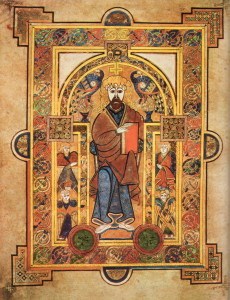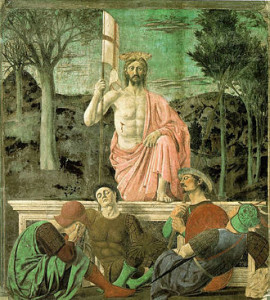Resurrection is the beginning of another earth. And another heaven.
Resurrection–despite its general amazement factor as a miracle–has remained the poor relation of gospel theology: e.g. “incarnation” and “atonement.” 
For “the Second Person of the Trinity” resurrection kind of goes with the territory, and when it comes to dealing with human sin Jesus’ death is what really counts.
To understand the importance of the resurrection of Jesus, we must first make clear that resurrection cannot be separated from the cross. It is the resurrection of the Crucified victim.
See Paul’s famous statement in Philippians.
“I want to know Christ and the power of his resurrection and the fellowship of his suffering, being conformed to him in his death, so that I may somehow attain to the resurrection of the dead.”
You see here how entangled are the two themes. The statement is chiastic, with the resurrection at both ends, and the suffering and death as the cross-over in the middle. You cannot separate the two–they are like two twined strands of DNA. 
The Crucified is raised! And we have always to maintain this structural reality: it is the total overturning, through nonviolence, of a death sentence imposed by the powers of this world. Only on this basis can we understand Girard’s famous revelation of the victim. In terms of the gospel, it is only because the Crucified is raised as peace that we know the victim of collective human violence is innocent.
But today because the victim stares us in the face everywhere we continue to forget the structural event that made it happen. We separate the Crucified from Resurrection.
As hinted above, a lot of the blame for this must fall on past theology. In the past the teaching of resurrection was swallowed up by the function of the death. The death, not the resurrection, had exchange value. Jesus’s death was our substitution, not the resurrection. This death was in fact a meaning the world understood–it could deal with it and use it: an exchange with God through violence meant that violence still had a role. So then the resurrection becomes an afterthought, a remainder we are not sure what to do with, despite the fact that one part of the mystery of Christ’s act of redemption makes no structural sense without the other.
The resurrection is the culture of the New Testament in every sense.
The New Testament dwells within the Resurrection. It is unthinkable outside it. Every page, every word vibrates with its pivotal meaning. 
The resurrection of Jesus is a new language of human being. It is a definitively new point of reference in contradiction of the world. It is another fabric of being not dependent on scapegoating and victims.
That is why the early Christians were able to offer forgiveness and nonviolence without a second thought–because they had entered a totally new experience of being human.
It is essential to grasp this. We cannot stop being human beings by mere moral command. We cannot stop collectively scapegoating if our very humanity depends on it, which it does! The only way to stop is if there is a new collective basis of humanity revealed; if the revelation is sufficiently dramatic and shared to make a new community possible. This is resurrection. It is the in-breaking into history of indestructible forgiveness and nonviolence.
Now, with a political triumph of exclusion and othering, resurrection as the basis for new humanity has never been more crucial. The negative half of gospel anthropology–the disclosure of the victim–has taken the world by storm, and everyone now instinctively sides with the victim and claims to be the victim. It is time for the positive half–the resurrection humanity of love and forgiveness–to become equally well known. The whole world can learn this new thing (and in many ways is learning it). But it is surely down to those who claim to be church–Christian community–to show themselves as compelling examples.
“For God so loved the world that he gave his one and only son, that everyone who believes in him shall not be wiped out but have unbounded life. For God did not send his son into the world to condemn it, but to save the world through him.” 